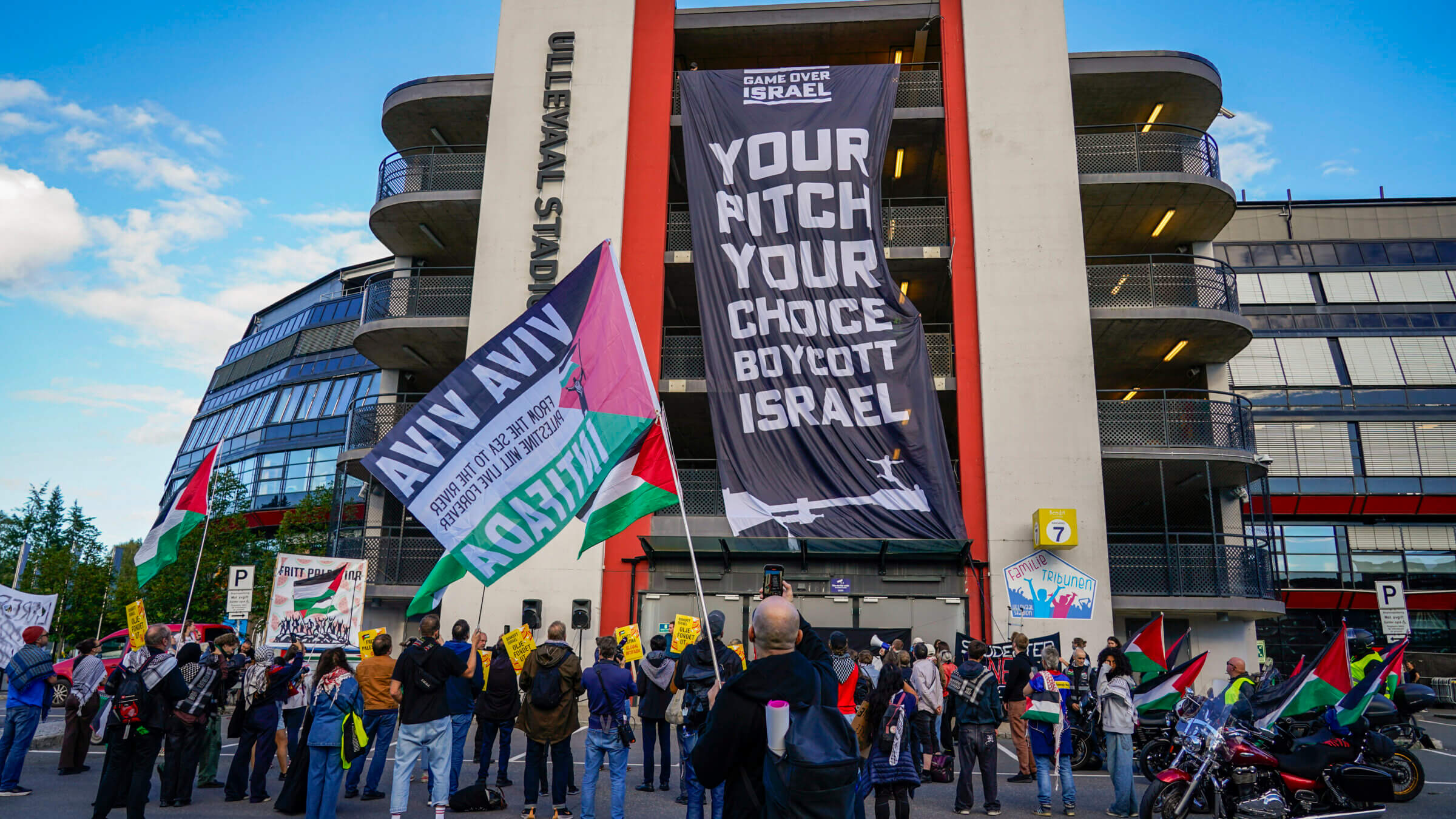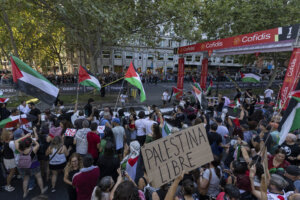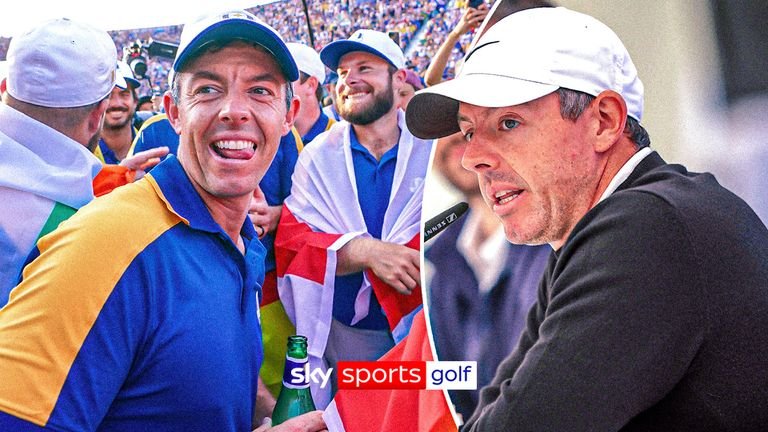
Members of the Action Group for Palestine demonstrate in Oslo on Sept. 17, ahead of the 2026 World Cup qualifying match between Norway and Israel. Photo by Gorm Kallestad/NTB/AFP via Getty Images

By Louis Keene
September 25, 2025
European soccer federation UEFA is reportedly set to vote soon to ban Israel from international competition over the war in Gaza, which would prevent Israel from qualifying for the 2026 World Cup.
A majority of the organization’s 20-member executive committee is expected to approve any resolution to suspend Israel, according to The Associated Press, citing two anonymous sources. The report did not specify when the committee would convene.
Such a decision, amid escalating calls worldwide to isolate Israel, would likely represent the biggest cultural sanction against Israel since the Hamas massacres inside Israel on Oct. 7, 2023, which launched the war. It would hit the sport widely seen as Israel’s most popular, and place Israel alongside pariah states like Russia and Belarus, which have been banned from UEFA competition since the former’s invasion of Ukraine in 2022.
A ban would also derail Israel’s promising if still longshot campaign for qualification to the World Cup, where it has only appeared once, in 1970.
How, why and when Israel could get banned
UEFA, which stands for Union of European Football Associations, is a soccer governing body based in Switzerland that organizes international matches between 55 countries, including Israel, which joined in 1992. (Israel had previously competed in Asia’s soccer federation, before it was kicked out in 1974 due to the Arab League boycott.) Among those games are World Cup qualifying matches, through which UEFA selects 16 national teams to send to the global games.
Under UEFA’s bylaws, a country or a club can be sanctioned in myriad ways for myriad violations, none of which are explicitly war-related. But grounds for Israel’s exclusion may be found in a pair of broad UEFA rules that were previously used to ban Russia and Belarus, one which gives the executive committee the power “to decide on all matters not covered in these statutes” and another that charges UEFA “to promote football in Europe in a spirit of peace.”
Any suspension — which could last indefinitely — would have to be approved by the executive committee at a meeting of UEFA Congress, which convenes once per calendar year and was held in April. However, a second congress can be called for significant matters.
The 20 voters on the executive committee include UEFA’s president, Aleksander Čeferin, who signaled a tougher stance toward Israel this summer when a huge banner reading “Stop Killing Children, Stop Killing Civilians” was displayed on the field at the 2026 UEFA Super Cup.
Čeferin, who is from Slovenia, a country leading efforts in Europe to isolate Israel, later told Politico that anyone criticizing the banner was an “idiot,” adding, “What’s happening with civilians there is personally hurting, killing me. It’s impossible to see these things anymore.”
Other representatives on the committee include the head of Israel’s soccer federation, Moshe Zuares, and billionaire Qatari businessman Nasser Al-Khelaifi. While Qatar is not a UEFA member, Al-Khelaifi is president of European club soccer powerhouse Paris Saint-Germain.
There is also pressure on UEFA coming from outside the organization: earlier this week, seven independent experts working with the U.N. Human Rights Council called on UEFA and FIFA to ban Israel.

How does this affect FIFA and World Cup competition?
If Israel can’t play in qualifying matches, it can’t qualify for the 2026 World Cup, which will be held next summer in the U.S., Canada and Mexico.
It’s a bit tricky for one reason: the World Cup isn’t organized by UEFA, but by FIFA, the global soccer body. And while the two organizations were aligned on Russia in 2022, they seem likely to diverge when it comes to Israel because of FIFA leader Gianni Infantino’s coziness with President Donald Trump. A State Department spokesperson told the AP that the U.S. would work to stop any efforts to ban Israel’s team from the World Cup.
Though it is experiencing a good run of form on the pitch, Israel was unlikely to qualify even without sanctions. It is currently third in its qualification group behind Italy and Norway, having lost to both; the top two countries in each group go to the World Cup. At this point, the Israeli team — led by ex-English Premier League winger Manor Solomon — needs some luck (namely a shock upset or two by lowly Estonia or Moldova).
Israel’s next qualifier is scheduled for Oct. 11 against Norway.

Has Israel faced any other sports sanctions from the war in Gaza?
Nearly two years into the war, the most high-profile public sports sanctions against Israel have come from the International Federation of Muaythai Associations, the umbrella group for an ancient martial art. The IFMA, which implemented the ban in July, still allows Israeli athletes to compete, but as a “neutral individual athlete” not representing any country. The federation banned the Israeli flag and the Israeli anthem from all international competition.
Israel has faced challenges at other competitions. The presence of an Israeli team at the Spanish Vuelta, a top cycling race, drew thousands of protesters, preventing the race from ending miles short of its finish line. Hundreds of Canadian athletes and academics urged Tennis Canada to cancel Davis Cup matches with Israel. And pro-Palestinian protesters turned out en masse to during this week’s 2025 European Baseball Championship in Rotterdam.
And some of Israel’s soccer opponents have registered their displeasure as well. The Italian association of soccer coaches called for Israel’s expulsion from qualifiers, and Norway said it would donate proceeds from hosting Israel for their Oct. 11 qualifier to humanitarian relief efforts in Gaza.
How would sanctions affect Israeli club football teams like Maccabi Tel Aviv?
A ban suspending Israel from international competition could extend to club soccer teams. Russian club teams are currently banned from competing in UEFA club competitions, including the Champions League and the Europa League.

What recourse does Israel have to respond?
Zuares, the Israeli soccer federation boss, Prime Minister Benjamin Netanyahu and Sports and Culture minister Miki Zohar have been working behind the scenes to fight the looming ban, Zohar’s office said Thursday.
“The right step now is to act responsibly with the professionals and not to make statements, and this is how all the parties involved in the efforts are acting,” the office told ESPN. “We will address this later.”
Israel can appeal any UEFA decision to the Court of Arbitration for Sport, which is also based in Switzerland. (If precedent is any indication, CAS upheld UEFA’s sanctions on Russia.)
Israel can also do what Russia did after losing its appeal — look outside of Europe. Russia has not stopped playing soccer — it just plays against countries not bound by the UEFA ban. Its last three opponents were Qatar, Jordan and Belarus.
What does this mean for Israel in the Olympics?
The International Olympic Committee affirmed earlier this month that teams representing Israel are recognized and “have equal rights” to teams representing Palestine.
“Teams from both participated in the Olympic Games Paris 2024 and their athletes were living peacefully together under one roof in the Olympic Village,” the IOC said on Sept. 6 in a statement.
Louis Keene is a reporter for the Forward. His work has also been published in The New York Times, New York magazine and Vice. He is based in Los Angeles.








